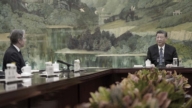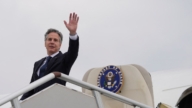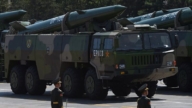【新唐人2014年10月23日讯】今年以来,中共当局接连公布了几起涉及军队方面的泄密案件。中共国家主席习近平也于数日前下令,要求加紧对军队信息安全管控。那么,这其中说明了什么问题呢?一起来看看。
日前,经中共国家主席习近平批准,中共中央军委印发了《关于进一步加强军队信息安全工作的意见》,要求“推进信息安全集中统管”,并加快构建军队信息安全防护体系。
《解放军报》在刊登这条消息时称,这是中共对来自虚拟空间威胁做出的反应,以及有关军队信息安全方面的重大举措。
美国中文杂志《中国事务》总编辑伍凡认为,由身为中共国家主席的习近平,亲自发布这个命令,可见中共军队信息安全方面存在的问题非常的严重。而不少涉及泄密案的,其实都是中共的高官。
美国中文杂志《中国事务》总编辑伍凡 :“以前我就听讲过,在中共的外交部有一批日本帮哎,在中国国务院里面有一批日本帮哎,专门替日本人讲话的。因为共产党本身就是个卖国贼嘛!这些人都是共产党的高官,包括他们的子女。”
今年以来,中共官方接连公布了多起间谍案、涉密案。
5月4号,广东公布一起网络窃取军事机密案,据说有40人被策反。
8月4号,中共方面宣称,一对加拿大籍夫妇因涉嫌窃取中共国家军事和国防科研秘密而被审查。在报导这一消息时,大陆媒体也对泄密的中共高官、学者等进行了盘点。
8月5号,哈尔滨某大学一位在读研究生,被指因涉嫌泄密案而被捕。
这么多间谍、泄密案件被集中公开,这在以往并不多见。
伍凡:“包括政治、经济、军事、外交,各个方面都在泄密呀。中共现在高层有很多很多外国的间谍。所以共产党基本它保不住密了,保不住了。”
事实上,中共今年也采取了一系列措施来加强。
2月,中共中央网络安全和信息化领导小组在北京宣告成立,由习近平亲自担任组长,李克强、刘云山任副组长。这一人员构成表明,网络安全和信息化被提高到空前重要的地位。
3月1号,中共《保守国家秘密法实施条例》生效。
而后,中共又禁止中央机关采购和安装Window 8操作系统、禁止采购赛门铁克和卡巴斯基杀毒软体、启用IBM的高端服务器,禁止采购苹果手机等。
那么,这些措施是否能有效监控网络信息安全呢?
中国问题独立评论员李善鉴:“说不用windows8,不用iphone,从专业角度讲,它并不是一个正确的措施,而且不能解决问题。它用的所有系统,最后都是美国或者开源软件做的事,它根本没有可能自己去搞一个系统。如果它真的搞了个什么系统的话,以中国目前的水平,漏洞肯定还会更糟。可是鼓吹这些事情的人,可以冠冕堂皇的用这些方式去搞钱。”
2006年,中共也曾发出对微软系统的明文禁令,然而当时由中共高调资助的红旗Linux项目,最终沦落到以清算收场、员工集体讨薪的地步。
对此,美国哈佛大学伯克曼网际网络与社会中心研究员毛向辉评论说,“因为纠结于国产操作系统,滋养了一批‘口号鼓吹家’和‘国产操作系统企业’,他们打着国产的旗号,兜售民族产业的招牌,却丝毫没有任何真正底牌。”
中国问题独立评论员李善鉴认为,中共面临的并不是技术问题,也不是搞个什么法律法规就能解决的问题。
李善鉴:“中国老百姓对它都有很大的不满,谁会全心全意的为它卖命?信仰缺失了,这些人你指望着他去给你保守秘密吗?可能别人只要出了钱了,这个事情就会发生。”
美国《外交家》杂志网站此前曾分析,中共除担忧外部威胁外,也依然担心能否对国内网络上的内容进行有效控制。
采访/易如 编辑/王子琦 后制/肖颜
Xi Jinping Rattled by Military Leaks
This year, the Chinese regime announced several cases
involving military leaks.
Chinese President Xi Jinping also ordered intensive management
and control to military information.
What does this mean? Let’s take a look.
Recently, approved by the Chinese President Xi Jinping,
the Chinese Communist Party (CCP) Central Military
Commission issued suggestions to:
Further Strengthen Military Information Security;
He demanded the speedy centralization of security information
and the acceleration of the construction of a military information
security protection system.
People’s Liberation Army Daily claimed that it’s a reaction to
the threat from cyber space
and major leaks of military information security from the
CCP at the time of this news report.
US Chinese magazine China Affairs editor Wu Fan believes:
the CCP military information security has serious problems
because the CCP President, Xi Jinping personally issued
this order.
And most leak cases involve CCP senior officials.
Wu Fan: “I heard there is one group of Japanolatries in the
CCP Foreign Ministry and China State Council separately to
speak to the Japanese.
Because the Communist Party itself is a traitor! These people
are Communist Party senior officials, including their children. “
This year, Chinese officials announced several espionage and
leak cases.
May 4, an Internet military leak case was announced in
Guangdong with allegedly 40 people involved in the
subversion.
August 4, CCP claimed that a Canadian couple is under
investigation on suspicion of stealing national military
information and defense research secrets.
Mainland media also checked out the CCP officials and scholars
who leaked before when reporting the news.
August 5, a graduate student at a university in Harbin was
arrested on suspicious of leaking.
It’s rare for so many spy and leak cases to hit the news all
together.
Wu Fan: “There are leaks in all aspects, including political,
economic, military, and diplomatic.
The CCP senior level has a lot of foreign spies.
So the CCP can not hold any secrets."
The CCP have taken a series of measures to strengthen
and seal up the leaks.
In February, the CCP network security and information
technology team was set up in Beijing, headed personally by
Xi Jinping.
Li Keqiang and Liu Yunshan are deputy heads.
The composition showed network security and information
technology have been raised to unprecedented importance.
March 1, the CCP Regulations for the implementation of the
law on Guarding State Secrets took effect.
Then, the CCP banned central offices from purchasing and
installing Windows 8 operating system, Symantec and Kaspersky
antivirus software by using IBM high-end servers;
They also banned Apple mobile phone.
So, will these measures effectively monitor internet security?
Chinese independent commentator Li Shanjian:
“from a professional point of view, a ban on Windows 8 and
iphone are not a proper measure and can not solve all problems.
All systems they use, are designed by US or a software
development company.
They are unable to design their own system.
Based on current standards, if they design their own system, it
might have more bugs.
However, the system development is an ulterior reason for
promoters to make money."
In 2006, the CCP also issued a decree to ban the Microsoft
system.
However, the high-profile project Red Flag Linux, funded by
the CCP, eventually ended up in liquidation and the employees collectively asked for a salary.
In this regard, the US Harvard University Berkman Center
Internet and Society researcher Isaac Mao commented:
“slogan experts and national operating system enterprises are
nourished because of national system tangle.
They have no cards but to peddle national industry design under
the name of national design.
Li Shanjian believes that the CCP’s problem is not a technical
issue or solved by law and regulations.
Li Shanjian: “Chinese people have a lot of dissatisfaction
with it. Who will devote their whole heart to serve them?
Without believe, how can you count on these people to keep
secrets for you?
Commitment will weaken when someone else gives
them money."
US Diplomacy magazine website previously analyzed, that in
addition to external threat concerns, the CCP also still worry
about whether they can control internal Internet effectively.
Interview/YiRu Edit/Wang Zhiqi Post-Production/XiaoYan




























